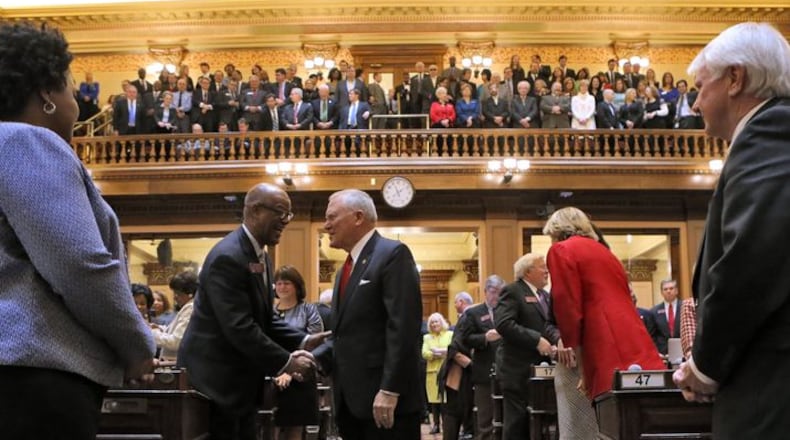The Era of Good Feelings under the Gold Dome is suddenly a lot less good.
Things have been pretty chummy the past six years. It began with the ascension of David Ralston as speaker of a House that, under previous management, feuded often with the Senate. Soon afterward came the election of Nathan Deal, whose approach was greeted by legislators as a welcome change from the more confrontational style of his predecessor.
Much of that is in serious doubt after two high-profile vetoes. A broad-based failure to sell the religious-liberty bill to critics in the business community doomed that measure. A miscommunication — or something — revealed Deal's support for the campus-carry bill wasn't as bullet-proof as legislative leaders thought.
It'd be wrong to say we've reached the same level of acrimony as before 2010. But there is a great deal of nervousness that the rest of Deal's agenda — particularly his Opportunity School District , on the ballot this fall as a constitutional amendment, and a more comprehensive education-reform package that was delayed until next yea r — is in jeopardy.
Social conservatives are angry about those vetoes. Republicans in west Georgia voted to censure Deal . The state gathering in early June could devolve into a spasm of backlash at the governor now that delegates need not spend time positioning themselves for a contested national convention in Cleveland.
Some legislators grumbled late in the session, as word got out that Deal was likely to veto the religious-liberty bill: If he did and if campus carry fell, too, they might not find the time to campaign for his OSD referendum. I’ve heard similar sentiments since.
That would be a mistake.
I understand the angst about the religious-liberty bill, which proponents finally got out of the Legislature in their third year of trying. I’m more agnostic about campus carry; I don’t see the evidence that adding (or subtracting) guns at the margin would lead to significantly different results.
But rejecting the opportunity to improve education policy would be a terrible way to lash out.
OSD is, above all, an accountability measure that is already yielding results even before becoming law. (See the big changes coming to some of Atlanta's worst public schools.) Done right, it will strengthen accountability for local districts while giving parents and communities, not the state, some of the authority and responsibility school boards historically have held. That's accountability with control closer to students and families, not farther from them. That's a conservative idea.
We don’t yet know the exact combination of policies in Deal’s broader reform package. But the rough outlines — funding that’s based on students, not programs; compensation that treats teachers more like other professionals; enhancing early learning and career training — suggest it’ll be the kind of package this state needs to move forward.
Those are things for which Republicans ought to fight together, not against one another out of spite. Nathan Deal will be the least of the victims if they are defeated.
About the Author


